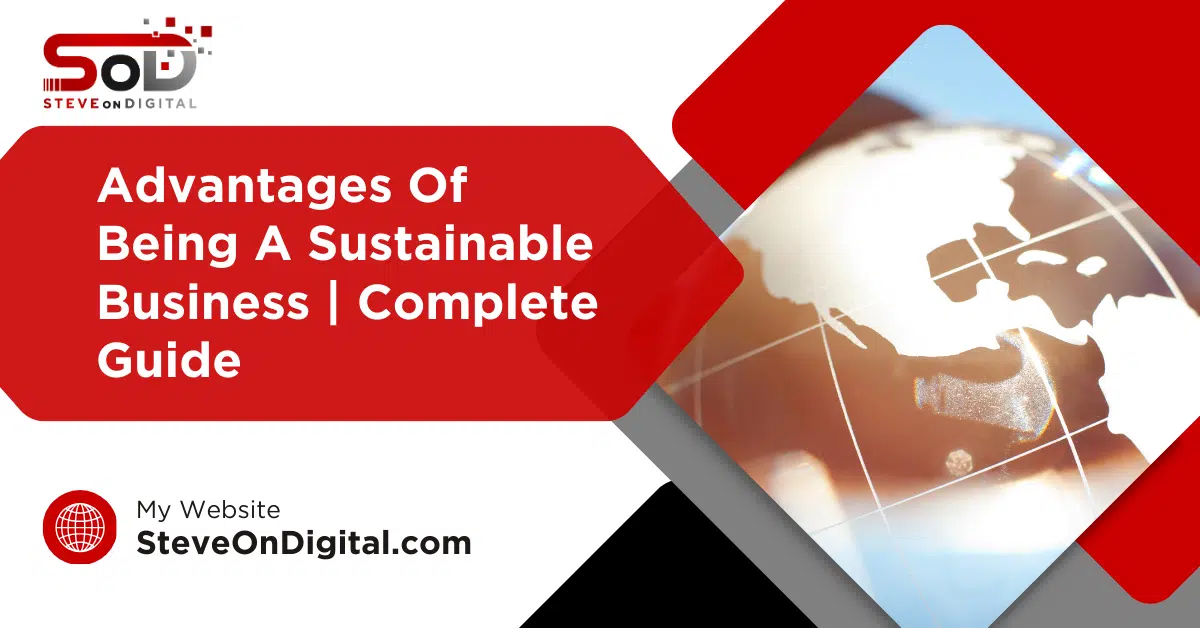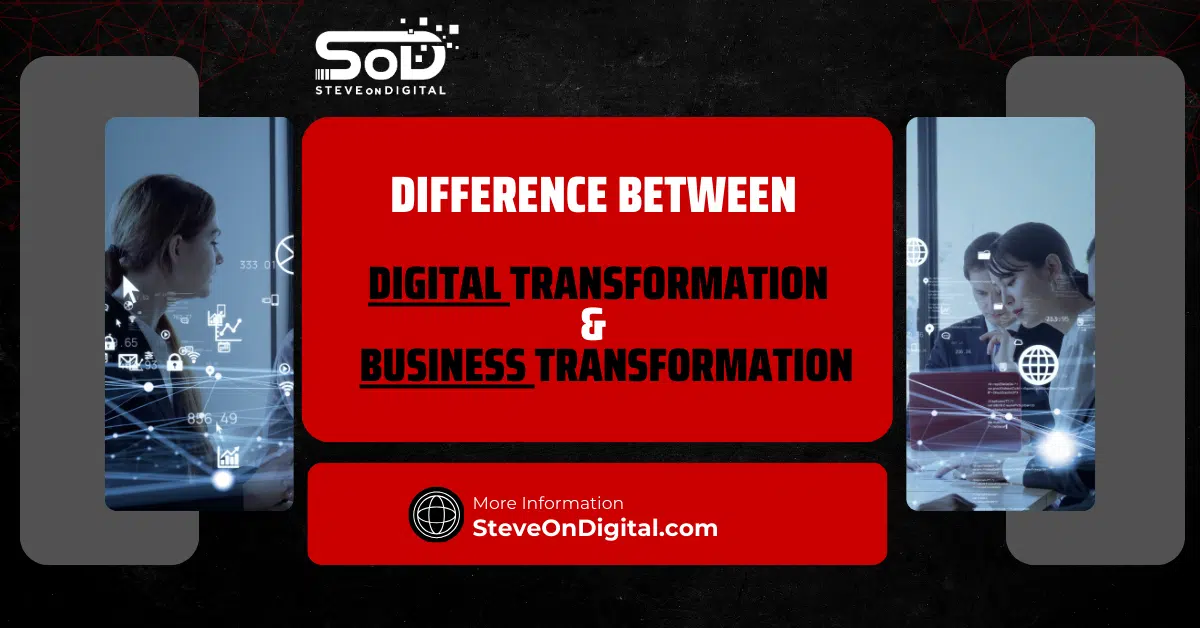Hello, I’m Steve Johnston, owner and author of SteveOnDigital, specializing in guiding small and medium-sized businesses through digital transformation.
With a background in electrical engineering, an MBA, and a master’s in Project Management, I bring a depth of knowledge to help over a million business leaders optimize their digital strategies.
My approach is deeply personal, reflecting my commitment to family, continuous learning, and active involvement in community and economic development initiatives.
In this blog post, I will explore the profound advantages of being a sustainable business.
Sustainability is more than just an environmental gesture; it is a comprehensive approach that integrates environmental, social, and economic factors into the core operations of a business.
This not only aims for profitability but also fosters a thriving environment and community engagement.
Over the years, I’ve witnessed the evolution of sustainable practices from niche strategies to fundamental business imperatives, driving not only growth but also fostering a resilient and adaptable future.
Understanding Sustainable Business
Defining Sustainable Business
As I’ve observed in the digital transformation landscape, a sustainable business actively integrates environmental, social, and economic factors into its operations.
This means not just aiming for profitability but also caring for the planet and people.
It’s about creating a business that not only survives but thrives by respecting and enhancing the resources it depends on.
Incorporating a sustainable approach into business strategies is crucial, as it underscores the importance of addressing global challenges while aiming for financial success and a positive impact on both society and the environment.
Adopting a sustainable business model is key to ensuring long-term business success and resilience, as it opens up opportunities for economic growth, increases productivity, potentially cuts costs, and positions companies as leaders in tackling climate change and meeting consumer demands.
Evolution Of Sustainability In The Business World
From my years of experience, I’ve seen how the importance of sustainability in business has evolved from a niche advantage to a core necessity, highlighting why sustainability important is a key factor in business success today.
Initially, it was about reducing waste and conserving energy, but now it encompasses sustainability initiatives aimed at leading a brand towards a more resilient and adaptable future.
These initiatives have become integral to modern business strategies, focusing on long-term benefits, improving brand image, and providing a competitive advantage by appealing to conscious consumers.
Companies are increasingly expected to drive not just economic growth but social and environmental progress too, with an emphasis on investing in sustainability initiatives and seeking external certifications to gain consumer trust and credibility (IMD Business School) (S&P Global).
Key Advantages Of Adopting Sustainable Practices
Here are some of the key Advantages.
The growing consumer demand for sustainable products represents a key advantage for businesses focusing on sustainability, reflecting a significant shift in market dynamics and consumer preferences towards environmental responsibility.
Environmental Benefits Of Sustainability
Impact On Climate Change
In my role, steering businesses towards digital efficiency often parallels sustainability goals like reducing carbon footprints.
Sustainable businesses play a critical role in mitigating climate change impacts.
By adopting green technologies and reducing emissions, companies can significantly lower their environmental impact.
Current statistics show a pressing need for such measures as global temperatures continue to rise, threatening to break previous records (TravelPerk).
| Year | Carbon Emissions Before (tons) | Carbon Emissions After (tons) | Percentage Reduction |
| 2019 | 10,000 | 8,000 | 20% |
| 2020 | 10,000 | 7,500 | 25% |
| 2021 | 10,000 | 6,500 | 35% |
| 2022 | 10,000 | 5,500 | 45% |
| 2023 | 10,000 | 4,500 | 55% |
Waste Reduction And Resource Management
Throughout my career, I’ve promoted efficiency, which directly aligns with minimizing waste.
Sustainable practices involve not just waste reduction but smarter resource management.
This means using materials more efficiently and finding ways to recycle or repurpose what we can no longer use.
This approach not only protects the environment but also optimizes operational efficiency, reducing costs in the long run (TravelPerk).
Economic Impacts Of Sustainability
Cost Savings And Operational Efficiency
From my experience, integrating sustainable practices leads to significant cost savings.
These savings are primarily due to increased operational efficiency, such as using less energy or reducing waste, which in turn lowers operational costs.
Moreover, sustainable companies are often eligible for various incentives from governments and other organizations, which can further reduce expenses (TravelPerk).
Additionally, adhering to the government’s legal requirements for sustainability not only helps in avoiding costly penalties but also streamlines business operations, further enhancing cost-effectiveness and operational efficiency.
| Year | Operational Costs Before ($) | Operational Costs After ($) | Cost Savings ($) |
| 2019 | 1,000,000 | 950,000 | 50,000 |
| 2020 | 1,000,000 | 900,000 | 100,000 |
| 2021 | 1,000,000 | 850,000 | 150,000 |
| 2022 | 1,000,000 | 800,000 | 200,000 |
| 2023 | 1,000,000 | 750,000 | 250,000 |
Competitive Advantage And Market Position
Being a sustainable business can also give a competitive advantage in today’s market.
Global consumers, especially millennials, are increasingly making purchasing decisions based on the sustainability of products and services, showing a willingness to change their consumption habits for environmental sustainability.
By aligning with these values, companies can not only attract a broader customer base but also enhance their market position and brand image (TravelPerk).
| Metric | Before Sustainability | After Sustainability | Improvement |
| Market Share (%) | 15% | 25% | 10% increase |
| Customer Base Growth | 1,000 | 2,000 | 100% increase |
Social And Corporate Benefits
Here I have written some key Social And Corporate Benefits.
Investing in sustainability initiatives is pivotal for achieving social and corporate benefits, including enhancing brand reputation and attracting talent.

A productive workforce plays a crucial role in attracting and retaining talent, as employees aligned with the company’s sustainability values and mission are more engaged and motivated, contributing significantly to the company’s growth and sustainability goals.
Building A Responsible Brand
Enhancing Corporate Reputation
As I navigate the digital landscape with my business, SteveOnDigital, I’ve seen firsthand how integrating sustainability into our operations not only supports the planet but also significantly boosts our brand’s reputation.
Investing in sustainability initiatives is a key strategy in this regard, as it not only demonstrates a commitment to environmental and social values but also enhances corporate reputation and fosters customer loyalty.
Consumers today are more informed and conscientious than ever; they seek out brands that commit to positive social and environmental practices.
For instance, studies show that a strong commitment to sustainability can enhance customer loyalty and overall brand perception (IMD Business School) (S&P Global).
This is because being responsible goes beyond mere products or services—it’s about embodying values that resonate deeply with the public.
Attracting And Retaining Talent
In my experience, sustainability initiatives are a powerful magnet for top talent.
Professionals are increasingly looking for workplaces that reflect their values of environmental care, social responsibility, and commitment to sustainability initiatives.
Companies that prioritize green initiatives, community engagement, and invest in sustainability initiatives report lower turnover rates, greater employee satisfaction, and are more likely to attract and retain the best candidates.
This aligns with global trends where companies engaged in sustainability initiatives are not just preferred but actively sought after by top talent, highlighting the importance of these initiatives in building a competitive advantage and improving brand image through external certifications for sustainability (TravelPerk).
Strengthening Stakeholder Relationships
Investor Attraction Through High ESG Ratings
From the digital conferences I’ve attended and the conversations I’ve had with other business leaders, it’s clear that investors are pivoting towards companies with high Environmental, Social, and Governance (ESG) ratings.
These ratings are crucial because they demonstrate a company’s commitment to operating sustainably and ethically.
Sustainable investments are not just good for the planet; they offer a stable return on investment by mitigating potential risks associated with non-compliance and reputational damage (World Economic Forum).
| Year | ESG Rating Before | ESG Rating After | Change |
| 2019 | 55 | 65 | +10 |
| 2020 | 55 | 70 | +15 |
| 2021 | 55 | 75 | +20 |
| 2022 | 55 | 80 | +25 |
| 2023 | 55 | 85 | +30 |
Enhancing Customer Loyalty
In my role at SteveOnDigital, adapting sustainable practices has proven essential not just for attracting but also for retaining customers.
When customers notice that a company is making genuine efforts to operate sustainably, their loyalty intensifies.
Data supports that sustainability influences purchasing decisions significantly, with many consumers willing to pay more for products and services from socially and environmentally conscious companies (S&P Global) (TravelPerk).
Recognizing the preferences of global consumers, especially millennials, who are willing to change their consumption habits for environmental sustainability, can further enhance customer loyalty towards businesses that prioritize sustainable practices.
Strategic Advantages In Operations And Management
Innovations In Sustainable Business Models
One of the most exciting aspects of embracing sustainability has been the innovation it brings, particularly through the development of a sustainable business model.
In my journey with SteveOnDigital, implementing green technologies and sustainable methods within this model has not only opened up new avenues for profit and growth but also positioned us as leaders in tackling climate change and meeting consumer demands for sustainability.
This transformation isn’t just about being better for the environment—it’s about pioneering new ways of doing business that can lead to higher profitability, increased productivity, and potentially cutting costs, all while reducing environmental impact.
These innovative business models are now setting trends in the industry, showcasing how sustainability can drive success and mark companies as leaders in the field by adopting sustainable practices (IMD Business School) (World Economic Forum).
Compliance And Risk Management
Dealing with compliance is a significant part of running a sustainable business.
The landscape of legal requirements, including the government’s legal requirements, is continually evolving, and staying ahead means mitigating risks that could lead to financial or reputational damage.
Integrating sustainability practices helps businesses easily comply with regulations aimed at protecting the environment, emphasizing the connection between sustainable business operations and adhering to the government’s regulations for operating safely without negatively affecting the environment.
In my experience, this proactive approach not only helps in meeting government regulations but also strengthens the trust stakeholders place in a business.
Companies that excel in sustainability are often the ones that face fewer legal challenges and maintain a stronger stance in their respective industries (S&P Global) (TravelPerk).
Overcoming Challenges In Sustainable Transformation
Addressing The Cost Of Transition
One common hurdle I often hear about from fellow business owners is the perceived high cost of transitioning to sustainable practices.
However, from my experience running SteveOnDigital, these upfront investments are usually offset by the long-term savings.

For instance, by investing in energy-efficient technologies, businesses can reduce their utility costs significantly.
Furthermore, numerous studies and data indicate that operational costs decrease as resource efficiency increases.
Initiatives like government grants and tax incentives for sustainable projects can further alleviate these initial expenses, making the transition more financially viable.
Integrating Sustainable Practices Seamlessly
Another challenge is integrating these green practices into existing operations without causing major disruptions.
Over the years, I’ve found that the key lies in strategic planning and employee engagement.
For instance, by involving staff in the planning process and providing adequate training, companies can ensure a smoother transition.
Also, starting with small, incremental changes can help the workforce adapt without overwhelming them.
Utilizing digital tools to monitor and adjust the integration process in real time has also been invaluable for my business, allowing us to make adjustments on the fly and minimize disruptions.
Case Studies
Examples Of Successful Implementations
Looking at successful case studies has always provided me with motivation and actionable insights.
For example, companies like Patagonia and IKEA have not only implemented sustainable practices but have also centered their business models around sustainability initiatives.
Patagonia’s dedication to environmental causes, through its sustainability initiatives, and IKEA’s commitment to circular and sustainable production, underscored by their investment in sustainability initiatives, are exemplary.
These companies have shown that sustainability initiatives can be at the core of profitable business strategies, and they have reaped benefits in terms of market share, customer loyalty, and brand reputation.
Lessons From The Front Lines
From these success stories, several common themes emerge that any business can apply.
Transparency, commitment to genuine sustainability goals, sustainability initiatives, and continuous improvement are pivotal.
These companies continuously evaluate their impact, invest in sustainability initiatives, and engage with stakeholders to improve their practices.
For any business embarking on this sustainable journey, these lessons underline the importance of setting clear goals, maintaining transparency with customers and stakeholders, committing to ongoing improvement, and integrating sustainability initiatives as a core aspect of their strategy.
Investing in sustainability initiatives not only contributes to long-term benefits and improves brand image but also provides a competitive advantage by appealing to conscious consumers who prioritize environmental and social values.
Future Trends And Growth In Sustainable Business
Predicting The Path Forward
Looking ahead, I’m seeing some exciting trends in the sustainability sector that are set to reshape how businesses operate, with the adoption of a sustainable business model being at the forefront.
This model emphasizes the benefits and advantages of implementing practices that lead to leadership in tackling climate change, meeting consumer demands, increasing productivity, and potentially cutting costs.
It also highlights the potential for economic growth and the opportunities for companies to mark themselves as leaders in the field by adopting sustainable practices.
One major trend within this framework is the rise of green technology and its integration into the daily operations of businesses.
For instance, the use of AI to optimize energy use in real-time is becoming more common, allowing businesses to significantly reduce their carbon footprint.
Additionally, consumer attitudes are shifting; more and more, people prefer to engage with brands that demonstrate a commitment to environmental stewardship.
This shift is influencing businesses to adopt more sustainable practices not just out of necessity but as a core part of their growth strategy, underlining the critical role of a sustainable business model in shaping the path forward for sustainable business.
Sustainability As A Driver Of Innovation
In my experience at SteveOnDigital, sustainability has been a powerful catalyst for innovation.
We’ve explored ways to make our operations greener, from simple steps like reducing paper use to larger initiatives like adopting sustainable web hosting.
Incorporating sustainability initiatives into our strategy has not only driven technological and operational advancements but also significantly improved our brand image by appealing to conscious consumers.
Across industries, sustainability initiatives are pushing companies to rethink how they design products and services.
From biodegradable materials to renewable energy solutions, the drive for sustainability is spawning innovations that once seemed beyond reach.
Investing in sustainability initiatives and seeking external certifications for these efforts prove that environmental considerations can go hand-in-hand with cutting-edge technological advancement, providing a competitive advantage and long-term benefits.
Practical Steps To Embark On A Sustainable Journey
Conducting An Effective Sustainability Audit
One of the first steps any business should take is conducting a sustainability audit.
This process involves reviewing your current practices to identify areas where you can improve your environmental impact.

For example, at SteveOnDigital, we assessed everything from our energy sources to our supply chain partners.
This audit helped us pinpoint effective changes, such as switching to digital invoices to reduce paper waste, and choosing suppliers who prioritize sustainable practices.
Setting And Achieving Sustainability Goals
After identifying what needs improvement, the next step is setting realistic sustainability goals as part of our broader sustainability initiatives.
For instance, after our audit, we set a goal to reduce our energy consumption by 20% within two years as part of our commitment to environmental impact reduction.
We achieved this by investing in energy-efficient appliances and encouraging remote work to reduce commuting, showcasing how targeted sustainability initiatives can lead to significant improvements.
It’s important to set clear, measurable targets and review them regularly, seeking external certifications for these initiatives to gain consumer trust and credibility.
This not only ensures continuous improvement but also keeps the team motivated and engaged in our sustainability efforts, improving our brand image and providing a competitive advantage by appealing to conscious consumers.
Final Thoughts
The Enduring Importance Of Sustainable Business Practices
Reflecting on the journey of integrating sustainability into my business, I’ve seen firsthand the profound impact it can have—not just on the planet and our community but on our bottom line as well.
Investing in sustainability initiatives is a key aspect of this transformation.
These initiatives are essential for any business that wants to stay relevant in a world where consumers, employees, and stakeholders increasingly demand environmental and social responsibility.
Sustainable practices, bolstered by sustainability initiatives, are no longer just ‘nice to have’; they are crucial for achieving long-term business and environmental goals.
Moreover, seeking external certifications for these initiatives can significantly improve a brand’s image and provide a competitive advantage by appealing to conscious consumers who prioritize environmental and social values.
Encouraging A Shift Toward Sustainability
To fellow entrepreneurs and business leaders, my message is clear: embracing sustainability is not just about meeting regulatory requirements or appeasing a social trend.
It’s about setting your business up for future success and resilience through sustainability initiatives.
These initiatives are key to corporate social responsibility and can significantly impact environmental preservation.
Investing in sustainability initiatives not only leads to long-term benefits but also improves your brand image and provides a competitive advantage by appealing to conscious consumers who prioritize environmental and social values.
Moreover, seeking external certifications for these initiatives can enhance consumer trust and credibility, further solidifying your market position.
The journey towards sustainability, enriched by adopting specific sustainability initiatives, requires commitment and innovation, but the rewards—secured market position, improved stakeholder relationships, and a substantial contribution to global sustainability efforts—are immense and truly worth the effort.
By sharing these insights and steps, I hope to inspire other businesses to embark on their own sustainability journeys, leveraging the lessons learned and successes from businesses like mine to create a more sustainable and prosperous future.




